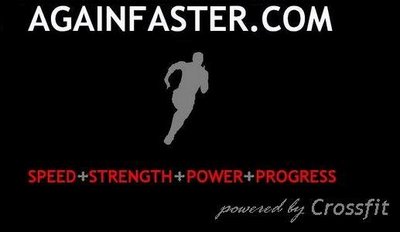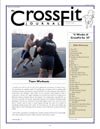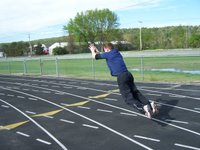Principles of Success

This weekend, I attended a USA Track and Field Coaching Certification at the University of Rhode Island.
Under the tutelage of Dan Laufer, Dave Kerin, and Steve Shutt, I got a great look at training theory, physiology, biomechanics, coaching psychology, and every track and field event under the sun.
As you can imagine, twenty-three hours of classroom instruction covers a heck of a lot of material, and I figure that the Again Faster Community might be a little blasé about the intricacies of the steeplechase. In order to keep you awake, I’m going to present you with the takeaways—the commonalities, huge truths, and key points. No hour-by-hour slogfest here.
Some of the salient points are geared towards coaching, others toward athletic performance. No matter which side of the clipboard and whistle you’re on, you’ll find some useful pointers here, and I’ll spare you the lengthy discussion on pole vault mechanics.
1.) “If you’re going to be demanding of your athletes, you’ve got to be demanding of yourself.”
Midway through the course introduction, Dan Laufer came out with this one. Whether you train hard or coach hard, it’s a wonderful maxim. Athletic success demands commitment, sacrifice, and a constant re-examination of goals, strengths, and weaknesses. You can’t expect a high level of dedication from the people around you if you don’t expect it of yourself.
2.) High intensity and high volume don’t go well together.
Our discussion on training theory centered on the proper periodization of workouts over macrocycles, mesocycles, and microcycles. That’s fancy coach-speak for years, months, and weeks. If you’re pushing yourself or your athletes to perform maximal work day in and day out, everything is going to go to sh*t. It might be fine for a while, but eventually the training load will catch up with you, and injury becomes likely. In the world of athletic training, more is not always better.
3.) Train the battery.
All the muscle in the world is useless if you can’t use it. The neuromuscular system must be developed to achieve any sort of athletic success—efficient muscle use relies on it. Toward this end, work with movements and rep schemes that maximize central nervous system development. This means multi-joint exercises executed with both feet on the ground.
4.) Strive for unconscious competence.
During his lecture on training psychology, Dave Karin explained the stages of learning and the hallmarks of athletic progress. When an athlete first learns a skill, they reflect unconscious incompetence. They perform at a sub-par level and they don’t know why.
As they practice, they move into the realm of conscious incompetence, demonstrating an awareness of technical defects but the short-term inability to correct them.
Further coaching leads to conscious competence, the stage where movement becomes mechanically sound.
According to Dave, this is the point where most coaches and athletes stop. Competent performance signals us to stop practicing and move on to the next challenge. This compulsion prevents elite performance. Those who perform at the highest levels of sport possess unconscious competence, the ability to perform flawlessly without a hint of inward focus. Reaching this level requires repetition and continuous effort.
If you’d like to be unconsciously competent, keep practicing long after Coach stops correcting your form. Rather than think “Pull, re-bend, extend, shrug, and drop”, think “Clean!” Until that becomes automatic, you’re not performing at an elite level.
5.) Focus on process instead of outcome.
Coach Shutt does everything he can to prevent his throwers from knowing how far their throws go. This forces them to focus on throwing mechanics rather than distances. As their mechanics become sound, distance is the natural outcome.
This philosophy has immediate applicability to Crossfit. I’ve seen shoddy form in pursuit of better times more often than I care to admit. Focus on doing every movement correctly, and WOD time will take care of itself.
Our first day at the USATF Certification was enormously enlightening, and we didn’t even touch the events. Tune in tomorrow for a discussion on the forces that make you “go”, proper sprinting technique, and the best way to jump high and long. You don’t need to be a track coach to benefit from this stuff.
Go faster!
Picture of Mike Powell courtesy of sportsheroes.net.

This weekend, I attended a USA Track and Field Coaching Certification at the University of Rhode Island.
Under the tutelage of Dan Laufer, Dave Kerin, and Steve Shutt, I got a great look at training theory, physiology, biomechanics, coaching psychology, and every track and field event under the sun.
As you can imagine, twenty-three hours of classroom instruction covers a heck of a lot of material, and I figure that the Again Faster Community might be a little blasé about the intricacies of the steeplechase. In order to keep you awake, I’m going to present you with the takeaways—the commonalities, huge truths, and key points. No hour-by-hour slogfest here.
Some of the salient points are geared towards coaching, others toward athletic performance. No matter which side of the clipboard and whistle you’re on, you’ll find some useful pointers here, and I’ll spare you the lengthy discussion on pole vault mechanics.
1.) “If you’re going to be demanding of your athletes, you’ve got to be demanding of yourself.”
Midway through the course introduction, Dan Laufer came out with this one. Whether you train hard or coach hard, it’s a wonderful maxim. Athletic success demands commitment, sacrifice, and a constant re-examination of goals, strengths, and weaknesses. You can’t expect a high level of dedication from the people around you if you don’t expect it of yourself.
2.) High intensity and high volume don’t go well together.
Our discussion on training theory centered on the proper periodization of workouts over macrocycles, mesocycles, and microcycles. That’s fancy coach-speak for years, months, and weeks. If you’re pushing yourself or your athletes to perform maximal work day in and day out, everything is going to go to sh*t. It might be fine for a while, but eventually the training load will catch up with you, and injury becomes likely. In the world of athletic training, more is not always better.
3.) Train the battery.
All the muscle in the world is useless if you can’t use it. The neuromuscular system must be developed to achieve any sort of athletic success—efficient muscle use relies on it. Toward this end, work with movements and rep schemes that maximize central nervous system development. This means multi-joint exercises executed with both feet on the ground.
4.) Strive for unconscious competence.
During his lecture on training psychology, Dave Karin explained the stages of learning and the hallmarks of athletic progress. When an athlete first learns a skill, they reflect unconscious incompetence. They perform at a sub-par level and they don’t know why.
As they practice, they move into the realm of conscious incompetence, demonstrating an awareness of technical defects but the short-term inability to correct them.
Further coaching leads to conscious competence, the stage where movement becomes mechanically sound.
According to Dave, this is the point where most coaches and athletes stop. Competent performance signals us to stop practicing and move on to the next challenge. This compulsion prevents elite performance. Those who perform at the highest levels of sport possess unconscious competence, the ability to perform flawlessly without a hint of inward focus. Reaching this level requires repetition and continuous effort.
If you’d like to be unconsciously competent, keep practicing long after Coach stops correcting your form. Rather than think “Pull, re-bend, extend, shrug, and drop”, think “Clean!” Until that becomes automatic, you’re not performing at an elite level.
5.) Focus on process instead of outcome.
Coach Shutt does everything he can to prevent his throwers from knowing how far their throws go. This forces them to focus on throwing mechanics rather than distances. As their mechanics become sound, distance is the natural outcome.
This philosophy has immediate applicability to Crossfit. I’ve seen shoddy form in pursuit of better times more often than I care to admit. Focus on doing every movement correctly, and WOD time will take care of itself.
Our first day at the USATF Certification was enormously enlightening, and we didn’t even touch the events. Tune in tomorrow for a discussion on the forces that make you “go”, proper sprinting technique, and the best way to jump high and long. You don’t need to be a track coach to benefit from this stuff.
Go faster!
Picture of Mike Powell courtesy of sportsheroes.net.




















1 Comments:
Jon,
Great post, thanks for sharing! Number 4 is my personal favorite, nothing like a scientific way of saying "practice makes perfect" to make client believe you know what you are talking about.
Bryan
Post a Comment
<< Home